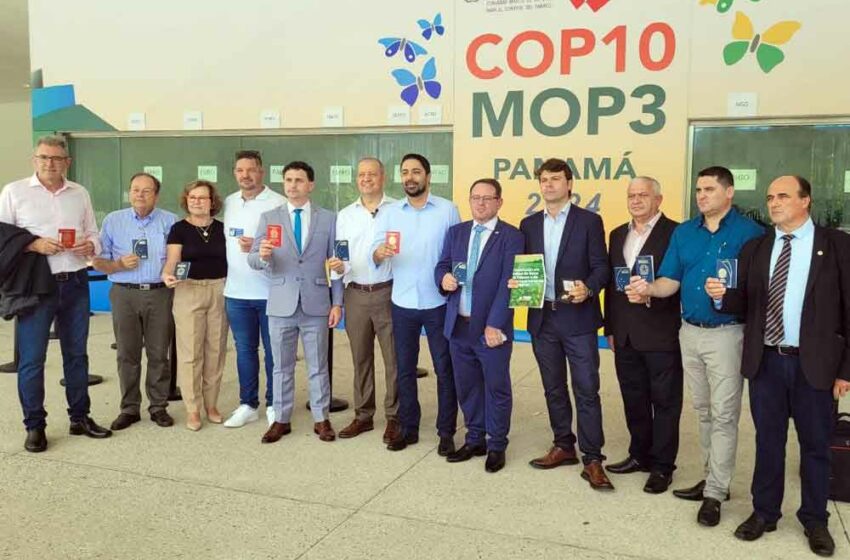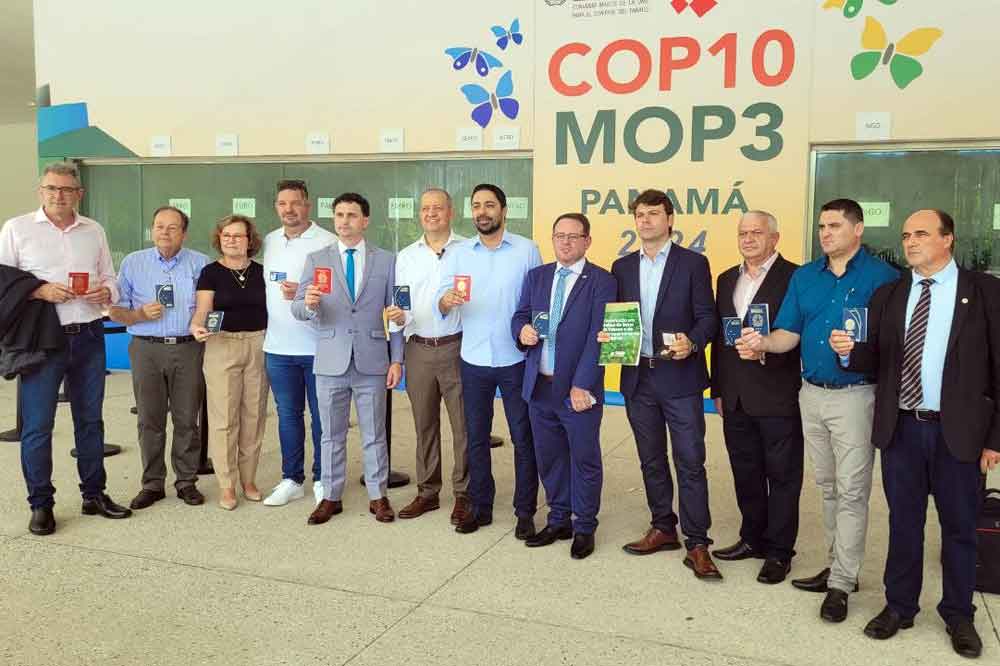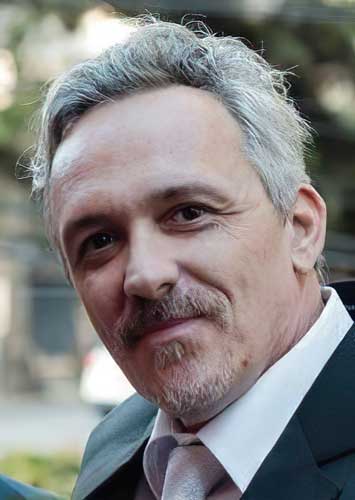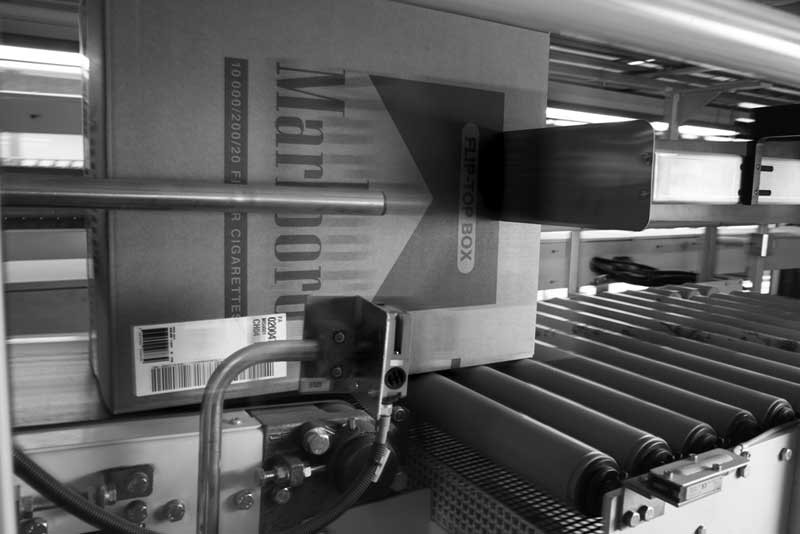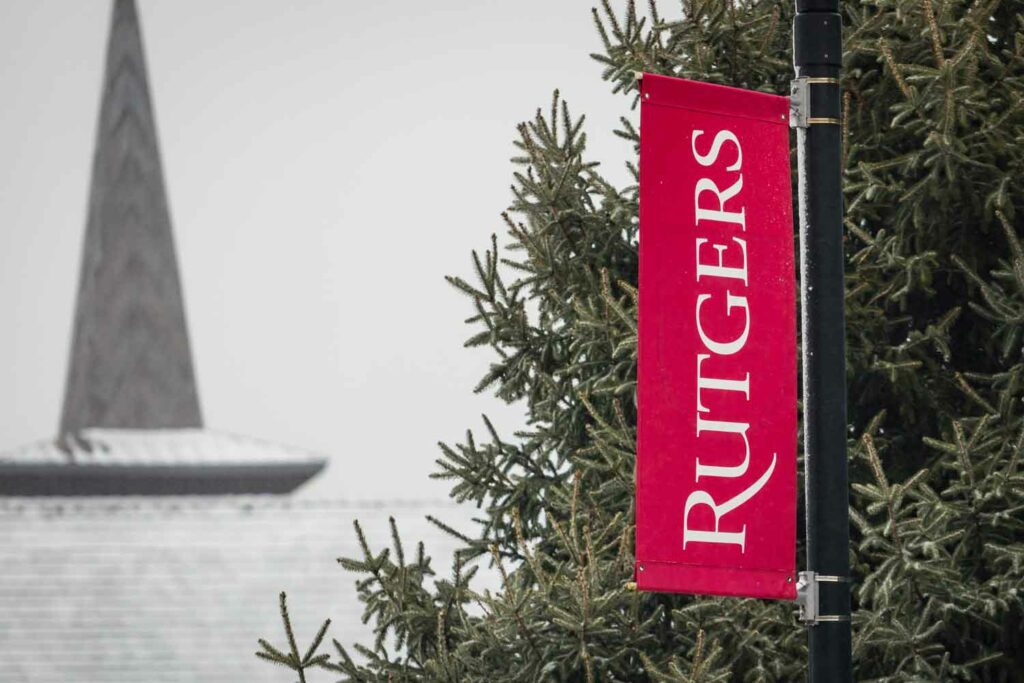The exclusion of Brazilian representatives from the recent WHO event sparks a debate on transparency.
By Claudio Teixeira
At the recent Conference of the Parties (COP10) to the World Health Organization Framework Convention on Tobacco Control (FCTC), held in Panama Feb. 5–10, the exclusion of Brazilian representatives from the state of Rio Grande do Sul, the epicenter of the tobacco industry, generated a wave of criticism for secrecy, exclusion and a lack of democratic transparency. The incident, marked by the refusal to accredit deputies, a state secretary and the press, reveals deep tensions in the global debate on tobacco control, casting doubt on the inclusiveness and openness of the international decision-making process. The controversy at COP10 underscores the challenge of redefining the fight against smoking concerning people, economies and local traditions.
On the first day of COP10, an incident involving a group of parliamentarians from Rio Grande do Sul, a state in the extreme south of Brazil, highlighted the exclusionary, opaque and nontransparent nature of this important international event in addition to tensions between global health policy and the multiple interests at stake.
The event aims to advance tobacco control policies, a topic of global importance given the impact of smoking on public health. Delegations from the state parties can participate. However, according to its regulations, the COP can invite other interested parties, such as intergovernmental and nongovernmental organizations, to participate as observers in its meetings. The exclusion of official representatives and the Brazilian press from the meeting generated controversy and heated discussions about democracy, transparency, the need for dialogue and the future of an entire production chain.
Rio Grande do Sul, a region with a long tradition in tobacco production, found itself at the epicenter of this debate. In this southern state of Brazil, tobacco is not just an agricultural crop; for many rural families, it represents the backbone of their livelihoods, with the sector generating $2.4 billion in exports in 2023. Tobacco is strategically positioned in the regional economy, surpassed only by soy in export volume.
The exclusion of political representatives and the Brazilian press from COP10 triggered a wave of outrage, highlighting a clash between those who can decide how global public health efforts will proceed and local communities’ social and economic realities.
‘Regrettable, Authoritarian and Intransigent’
State and federal deputies along with the secretary of rural development of the government of Rio Grande do Sul, Ronaldo Santini, expressed their frustration, describing the WHO’s action as “regrettable, authoritarian and intransigent.” The refusal to allow their participation in the event was seen not only as an anti-democratic act but also as a sign of contempt toward communities that economically depend on tobacco cultivation.
Federal legislator Marcelo Moraes was emphatic in his statement, underscoring the need to expand the debate to include additional dimensions, such as the economy and social aspects. He cited the situation in his region, where the livelihood of more than 70,000 households is sustained by tobacco production and more than 40,000 jobs are generated in its industry.
Moraes expressed his skepticism about the seriousness and democracy of the convention, criticizing its tendency to marginalize sectors directly involved in the discussion. “This debate needs to be broader,” he said. “I don’t believe this convention is serious, I don’t believe this convention is democratic … it simply excludes those who have a direct interest in this discussion happening here.”
The congressman also expressed his concern about the ongoing ban on electronic cigarettes in Brazil, noting the considerable number of users who turn to the illegal market to obtain these devices. He highlighted how this situation results in a loss of revenue for the country, which could even benefit from the export of these products. Moraes argued that the ban does not reduce the number of users and advocated for regulation that allows adjusting aspects of the product, which in turn could mitigate health risks and make it less attractive to minors and nonsmokers.
Regarding the refusal to grant accreditations to participate in the event, the deputy pointed to the organization of the event as responsible, highlighting the role of Vera Costa e Silva, the former general secretary of the event and current leader of the National Commission for the Implementation of the Framework Convention on Tobacco Control in Brazil. The deputy suggested, with a sense of certainty, that her influence within the organizing group could be the reason for the exclusion, given her refusal to allow opposing voices in the discussion.
Voices Unheard: The Exclusion of Rural and Worker Rights in Global Tobacco Control Dialogues
Heitor Schuch, a federal deputy respected for his dedication to the rights and interests of workers and rural communities, seems to have a deep commitment to these sectors due to his frequent participation in various legislative commissions, addressing crucial issues such as family agriculture, rural development and environmental conservation.
Under the scorching sun, outside the premises of the Panama Convention Center, the current leader of the Industry, Commerce and Services Commission in the Chamber of Deputies, Schuch did not hide his discontent and discomfort due to the refusal to allow him access to COP10 as an observer. The Gaucho legislator has clearly expressed his perception of a lack of welcome toward them, reflecting the climate of tension and exclusion that surrounded the event.
Schuch highlighted that the World Health Organization, through the Secretariat of the FCTC, seems to focus unilaterally, ignoring the critical need for dialogue and transparency in international conversations on tobacco control, where all voices, especially those directly affected, should be heard and considered. He stressed that the WHO is omitting the voices of rural producers, industrial workers and residents of the municipalities where the tobacco-producing companies are located. For Schuch, the exclusion of these important sectors from the conversation is not surprising as it once again evidences a disinterest in including multiple perspectives in the debate.
On the same day, the deputies’ nighttime visit to the Embassy revealed a complex stance by the Brazilian ambassador, Carlos Henrique Moojen de Abreu e Silva, regarding the exclusion of the delegation.
Initially, Abreu e Silva offered his support to the delegation, but later, at the COP10 plenary, he emphasized the importance of adopting policies aimed at reducing tobacco production, including tax reforms and the continuation of the vaping ban in Brazil.
These statements added a new dimension to the already tense debate on tobacco control policies, demonstrating the complexity of reaching a consensus on an issue that requires inclusive and thoughtful dialogue, taking into account both nicotine consumers and those involved in the tobacco production chain.
Silencing the Press: The Unprecedented Exclusion of Journalists from COP10 and the Quest for Transparency
Deputy Heitor Schuch shared that, although he had faced similar situations in the past, the recent exclusion of eight Brazilian journalists took him by surprise. He underscored a critical difference this time, highlighting that, unlike previous occasions, in Panama, there was an explicit prohibition against the presence of media.
This fact highlights a new layer of opacity and control over information emanating from crucial events like COP10, where transparency and access to information should be fundamental pillars. The decision to block press access affects not only freedom of expression but also questions the openness and accountability of international discussions on public health policies.
Schuch expressed his discontent with this measure, describing it as “regrettable,” especially because Brazil actively engages in promoting press freedom, ensuring its access to all kinds of events and activities. The participation ban in this context, according to the deputy, represents a clear concern that deserves serious and urgent dialogue with Brazil’s Ministry of Foreign Affairs.
This call to action underscores the need to uphold the principles of transparency and freedom of information, fundamental in any society that prides itself on being democratic, especially in international forums where policies with significant global impact are debated.
Among the media outlets whose accreditation remained “pending” are names like Ola Jornal, Folha do Mate, Radio Acustica FM, GZH, RBS TV and C3PRESS/The Vaping Today. This uncertainty regarding press participation reflects a broader conflict surrounding access to information and freedom of expression, essential in any debate of public relevance.
The withholding of accreditations for these media further highlights the opacity with which the event was handled, raising questions about the willingness to facilitate an open dialogue and broad media coverage on public health issues and global tobacco control policies.
One of the journalists excluded is Leticia Wacholz, the respected editor of Folha do Mate, a newspaper deeply rooted in the life of Venancio Aires city for its dedicated coverage of local interest issues. Her exclusion sets a disconcerting precedent, especially considering her previous participation in COP7 in India and COP8 in Switzerland, where she was accredited without any issues.
This time, at COP10, the lack of a clear justification from the organizers leaves a void of uncertainty about the basis of this decision. “We meticulously fulfilled all the requirements, submitting the necessary documentation within the established deadlines, and yet, we have been denied entry,” explains Wacholz, visibly frustrated by this unexpected barrier that prevents them from carrying out their journalistic work from Panama, where they moved intending to inform their community about critical developments.
The journalist underscored the importance of representing a region known for its tobacco industry, insisting on her commitment to offer balanced coverage that includes both public health implications and the interests of her community. “We know, of course, that we are journalists from a tobacco-producing region, but we also want to listen to the health side; it is very important to listen to the health side as well,” added Wacholz. She is aware that the decisions made in Panama will significantly impact her community.
Her determination to gain access reflects a widespread concern for transparency and the right to information, cornerstones in public debate and the democratic exercise. Wacholz noted that she still hoped for a definitive resolution regarding her exclusion. She commented that the delegation of deputies was in the process of establishing communications that could pave the way for dialogue, possibly with the National Implementation Commission of the Framework Convention, representing the country’s delegation at the conference.
The possibility of a meeting that opens doors to an understanding could not be confirmed, leaving in suspense the opportunity for excluded representatives and media to participate as observers and cover the global dialogue on tobacco control.
This uncertainty underscores the critical importance of a firm commitment to inclusivity and transparency for the press in international forums, where policies affecting communities and economies worldwide are discussed. The lack of access for the Brazilian press at COP10 highlights the critical need for a review of the “approval” procedures by the FCTC Secretariat.
Exclusion and Silence: The Controversial Interpretation of Conflicts of Interest at COP10 and Its Impact on Tobacco Control Dialogue
A journalist who preferred to remain anonymous commented: “It’s not just individuals considered persona non grata, but all opposing voices are labeled under Article 5.3 of the FCTC, which excludes the participation of organizations or representatives with any connection to the tobacco industry. A journalist coming from a tobacco agricultural and industrial region like Rio Grande do Sul, who wishes to work and inform their community about what is being debated here, seems automatically placed in that conflict of interest, even if they have nothing to do with the tobacco industry.”
This statement highlights the complexities and sensitivities around debates within the framework of the COP, illustrating how the interpretation of conflicts of interest can not only limit the diversity of perspectives but restrict the essential media coverage for a complete understanding of the topics under discussion.
In Rio Grande do Sul, where these journalists and official parliament representatives originate, tobacco cultivation is at the pinnacle of family farming enterprises. The region boasts 65,000 producers dedicated to this crop, who in the 2022/2023 season achieved an impressive production of 300 tons, translating into revenues of BRL4.6 billion ($928.61 million). Additionally, the tobacco industry provides direct employment to approximately 25,000 individuals, underscoring its predominant influence on the local economy.
The incident at COP10 highlights a global dilemma in the redefinition of Tobacco Control: the pressing need to rethink strategies worldwide and incorporate innovations in tobacco control that generate a tangible impact on the reduction of the global rate of diseases attributed to tobacco use. The organizers, under the pretext of avoiding the influence of the tobacco industry, have chosen to silence any critical or divergent voice and requests for debate, thus evading democratic scrutiny.
The question spontaneously arises: How is it possible to implement effective public health policies in a framework of lack of transparency, closed dialogue and total secrecy?
The challenge lies in finding a balance that benefits public health without compromising local economies, especially those revolving around controversial crops like tobacco. The exclusion of representatives from Rio Grande do Sul at COP10 uncovers not only a lack of commitment to democratic principles and diplomacy but also underscores the urgency for the WHO to foster open dialogue and develop policy strategies that harmonize global health goals with the economic needs of communities.
This entails the implementation of integrative strategies that encompass the realities of people. It involves investing in education, ensuring the right to information, promoting safer alternatives to cigarettes and establishing an open and constructive dialogue forum, where all stakeholders, from nicotine consumers to small tobacco farmers and politicians representing thousands of people, are assured that their voices and needs are considered.
In response to this situation, federal deputies Heitor Schuch, Marcelo Moraes and Rafael Pezenti along with state legislators like Edivilson Brum, Ze Nunes, Marcos Vinicius and Silvana Covatti expressed their protest through a note of repudiation, officially and firmly positioning themselves against the undemocratic stance of the FCTC Secretariat, since the event is financed with public funds. The WHO did not provide a specific justification for why the Brazilian deputies were prevented from attending COP10.



